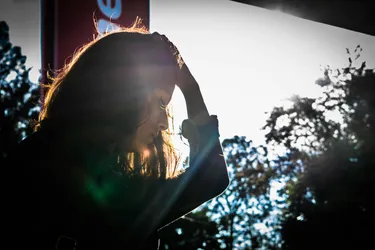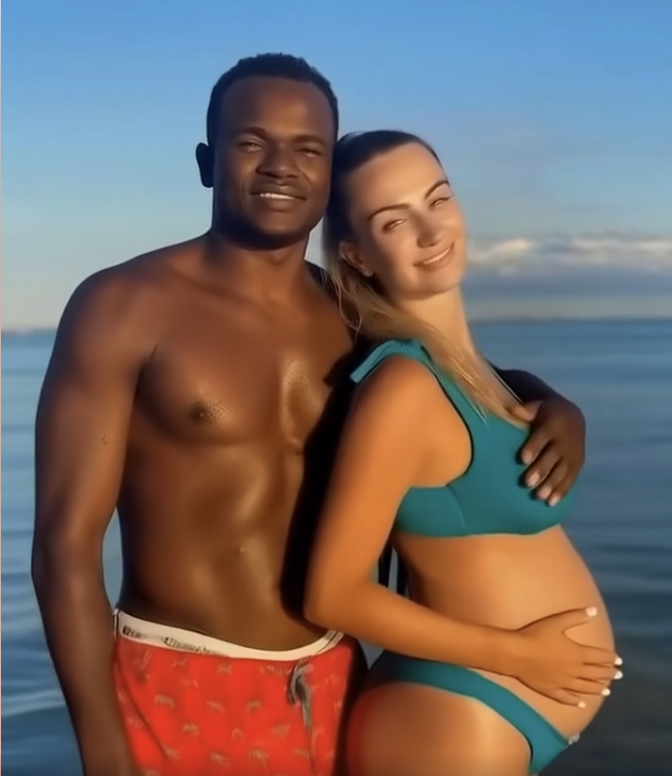Daniel eventually settled in another city, where he raised Michael—the lighter-skinned twin—on his own. To shield himself from questions he did not want to face, he repeated the same story to everyone he met: his wife had died giving birth. It was simpler than admitting the truth he refused to confront.
Michael grew up surrounded by comfort: strong schools, expensive toys, a home with a garden, and every material advantage his father could provide. Yet despite all of it, a quiet emptiness followed him through childhood.
One evening, while they sat at the dinner table, Michael finally asked the question that had lingered inside him for years.
“Dad… why don’t I have a mother? Or any baby pictures?”
Daniel’s hand froze in mid-air. His answer came short and flat. “She died when you were born.”
Michael accepted the explanation with a nod, but the sadness in his eyes deepened rather than faded.
In the meantime, Elena remained in the small town she had always called home, raising Malik—the darker-skinned twin—on her own. Life was unkind to her. People whispered behind her back, offering cruel assumptions and unfounded accusations. Still, she carried on, working long hours at a laundromat and cleaning houses at night. Whenever she looked at Malik, she saw strength, not pain.
“You are my heart, Malik,” she whispered every night. “One day, you’ll understand everything.”
As they grew older, Michael and Malik lived in worlds that could not have been more different.
Michael was gentle, artistic, and observant—a boy who poured emotion into his paintings. He often created portraits of people he had never met, faces that somehow felt familiar. When asked who they were, he always replied, “Someone I think I lost.”
Malik, in contrast, was determined and outspoken. He excelled in basketball, worked hard in school, and dreamed of becoming a geneticist—driven by a desire to understand the mysteries people used to mock him for. In his community, he was known as “the boy who didn’t look like his mother,” a label he carried for years.
After hearing harsh gossip at school one afternoon, Malik confronted Elena.
“Mom,” he said, hands shaking, “people say I’m not my father’s son. Is that true?”
Tears filled her eyes. “You are his son, Malik. You always have been. But your father… he could not see beyond what he thought he saw.”
Malik’s jaw tightened. “He left us because of my skin?”
She nodded gently. “He took your brother and walked away.”
“My… brother?”
The word stayed with him long after the conversation ended.
Twenty years later, their lives collided again.
On a rainy afternoon in New York City, Michael—now an art gallery curator—was preparing an exhibit centered on the themes of family and identity. As he positioned the final frame, he noticed a visitor standing still in front of one of his portraits. The young man had deep brown skin, a quiet intensity, and eyes that mirrored his own.
Michael approached him. “Can I help you?”
The stranger turned. For several seconds, neither spoke. The resemblance was unmistakable.
“I’m not sure,” the man said softly. “But you look… exactly like me.”
Michael frowned in confusion. “Like you?”
The visitor reached into his pocket and removed an old photograph—a picture of a woman holding a baby.
“This is my mother,” he explained. “She told me I had a twin brother. He was taken from us the day we were born.”
Michael felt his pulse quicken. “A twin? That can’t be true…”
But as he studied the man’s features—the shape of his eyes, the contours of his face—something deep inside him shifted.
“What’s your name?” Michael whispered.
“Malik.”
Michael stepped back in shock, reaching for the wall to steady himself. “I… I don’t know what to say.”
“It’s true,” Malik replied, his voice trembling. “We were born together. But Dad took you because he thought I wasn’t his.”
The gallery fell silent except for the steady sound of rain tapping against the windows.
In that moment, Michael felt his entire life unravel—every missing photograph, every unanswered question, every face he had painted without understanding why. They were not imagined. They were memories of a brother he had never known.
⸻
Author’s Note
This narrative is a fictional work created for storytelling purposes. Characters, events, and details have been adapted or invented to support the narrative structure. Any resemblance to real individuals, living or deceased, or to real events is purely coincidental. The text is not intended as factual reporting and should be interpreted solely as a work of fiction.




